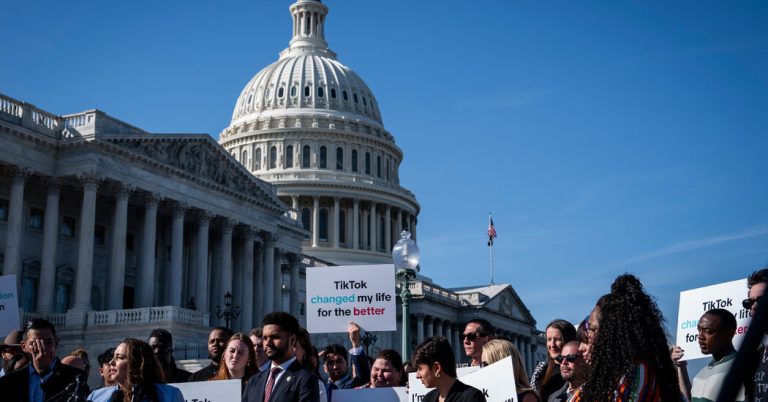TikTok explained Thursday why it believes the new federal law that could lead to a ban on the popular video app in January is unconstitutional, calling the legislation an “extraordinary restriction on speech.”
The company said Congress did not consider the law — which would have forced TikTok’s Chinese owner to sell the popular social media app or face a ban in the United States — with nearly enough scrutiny and attention.
TikTok made the arguments in a filing with the US Court of Appeals for the District of Columbia Circuit, where the company sued to block the law in May.
“This law is a radical departure from this country’s tradition of championing an open Internet and sets a dangerous precedent that allows political parties to target an unfavorable speech platform and force it to sell or shut down,” the company said. in Thursday’s filing.
The company also said it was not clear that Congress had considered the company’s efforts to reach a settlement with the Biden administration. To support its argument, the company released a trove of documents about numerous confidential meetings and other interactions with top federal officials, almost all of which are shrouded in secrecy.
The new documents include a 90-page proposal from TikTok on how it planned to address US national security officials’ concerns about the app, including concerns that the Chinese government could use it to spread propaganda or the collection of sensitive user data.
The Biden administration never gave its blessing to TikTok’s proposal, known as Project Texas, despite many discussions about it with the company.
TikTok also released a letter containing the dates and details of several meetings the company had last year with members of a secretive committee known as the Committee on Foreign Investment in the United States, or CFIUS.
The new law was signed by President Biden in April after swift and overwhelming bipartisan support in Congress. It requires TikTok’s parent company, ByteDance, to find a government-approved, non-Chinese buyer by mid-January.
The law could upend the future of an app that claims 170 million users in the United States and touches almost every aspect of American life.
TikTok sued the government in May, sparking a fight that many legal experts say will likely end up in the Supreme Court. The government is expected to submit supporting material for its case by July 26. Oral arguments in the case are scheduled for September 16.
The US government has shared its most serious national security concerns about TikTok’s involvement behind closed doors, including classified briefings with members of Congress.
The company has said it has offered extraordinary commitments to the US government to address its concerns, including third-party monitoring of TikTok content and a “shutdown option” if the company violated terms of a security agreement.
The filing sheds new light on TikTok’s talks with CFIUS, a panel of federal agencies that reviews investments by foreign entities in US companies. These interactions have been largely shrouded in secrecy for the past two years.
Prior to the law’s passage, TikTok was in limbo as the commission considered whether to approve its security plan.
The documents show that TikTok’s lawyers and the Biden administration went back and forth about the feasibility of a sale and whether the company could move its underlying coding out of China at least beginning in March 2023. A few months later, he said the company, gave a presentation to the Treasury Department that noted “that the positions of the US government and the Chinese government were completely incompatible, putting the company in an impossible position.”
The documents suggest that the last in-person meeting between TikTok and CFIUS was in September. It included “another technical discussion” around the challenges of moving the underlying coding from China. The company said it had heard little from management after that.
TikTok’s lawyers wrote to a Justice Department official after the new law was introduced in March, saying the company feared “CFIUS has been compromised by political demagoguery in this matter.”
The Justice Department said in a statement that it looks forward to defending the legislation, which it said “addresses critical national security issues in a manner consistent with the First Amendment and other constitutional restraints.”
“Along with others in our intelligence community and in Congress, the Department of Justice has consistently warned about the threat of authoritarian nations who can weaponize technology — like the apps and software that run on our phones — to use against us “, the statement said. “This threat is exacerbated when these authoritarian nations require companies under their control to hand over sensitive data to the government in secret.”




